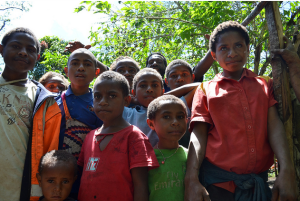 photo from the highlands of Papua New Guinea by eGuide Travel at Flickr Creative Commons
photo from the highlands of Papua New Guinea by eGuide Travel at Flickr Creative Commons
A piece in the magazine Science titled “Turning from War to Peace in Papua New Guinea” (Vol. 337, September 28, 2012) by Elizabeth Culotta describes a recent anthropological paper co-authored by Polly Wiessner of the University of Salt Lake City, who has worked with and studied the Enga people of Papua New Guinea for 25 years, and Nitze Pupu, a blind Enga law school graduate. Wiessner and Pupu conducted more than 300 interviews to understand how the Enga have reduced violence, which was always present but shot up precipitously with the introduction of gun use in the 1990s.
Culotta writes: “The interviews highlight several factors that helped break the spiral of violence. First, people were tired and impoverished by war and felt that the damage wrought by violence was not worth the potential benefits. Second, once men had eschewed violence, Christianity offered them institutional support for their stance. Third, the brand of justice practiced in the village courts restored good relations among clans.”
Rather than submit their grievances to state court, Enga have begun taking their cases to village courts, where outcomes will seem very familiar to practitioners and advocates of restorative justice: “the data suggest that compensating victims, rather than merely penalizing offenders, may prevent conflict from escalating,” writes Culotta.
One “egregious case” is presented in brief: “[A] man raped and killed a mother of five. Her husband chose to go to village court, where he could be awarded compensation that would help him marry again and pay school fees for his children, rather than send the offender to jail in state court.”
Culotta interviews Harvard University psychologist Stephen Pinker who, among experts, say that “the story of peace among the once-warlike Enga offers insight for the wider world.” At the end of the piece John Braithwaite of the Australian National University in Canberra is quoted as saying, “The societies that are most experienced at making war often have cultures with the greatest wisdom about how to make peace.”
Links to this piece and the full paper by Wiessner and Pupu in Science can be found here.
